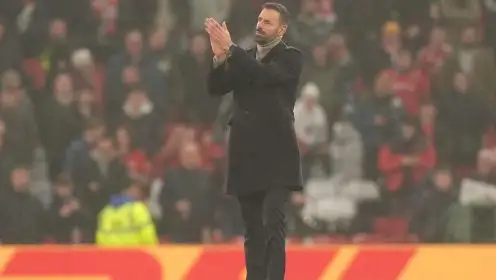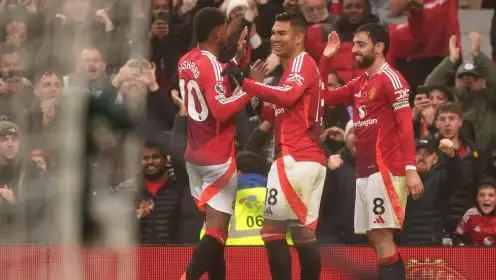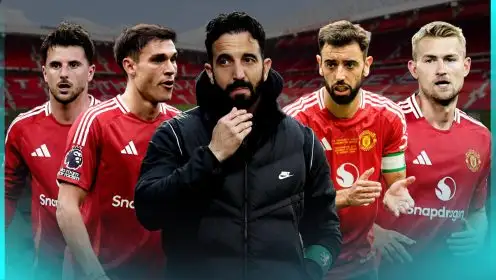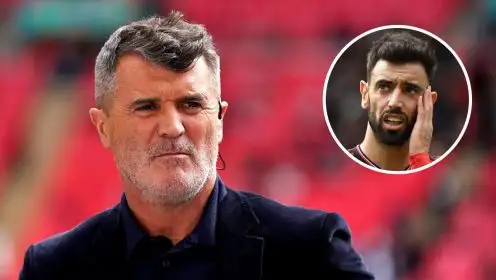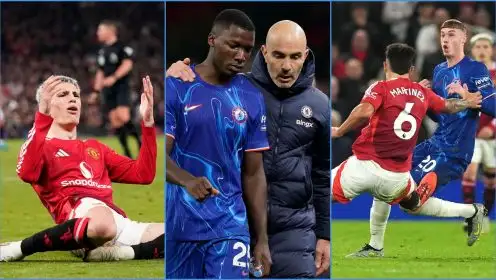16 Conclusions on Man Utd 2-2 Liverpool: Arrogance, Fernandes, Elliott, title race, Allardyce, Amad
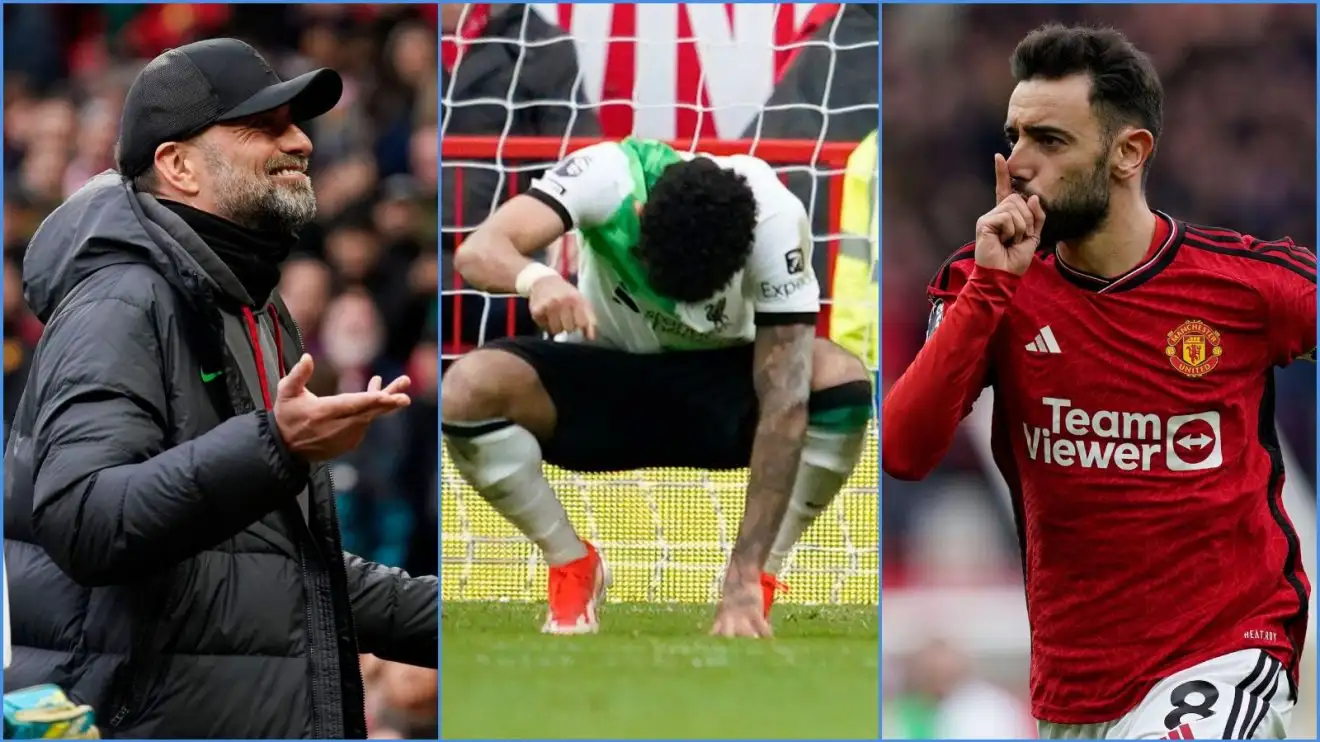
It should shame Liverpool not to have beaten Manchester United this season. But Bruno Fernandes always gives Erik ten Hag – or Sam Allardyce – a chance.
1) If Liverpool are to fall short in this title race, no dropped points will seem more unnecessary, costly and avoidable than the four they have let slip away against Manchester United. Never before has a side had as many shots against a single opponent in a Premier League season, yet those 62 attempts have been converted into two damaging draws.
Chuck in the FA Cup defeat and it’s 87 shots for two draws and a defeat. In the recent 7-0, 4-0 and 5-0 thrashings of the same opponent they had a combined 51 shots.
Manchester City have won twice against this Manchester United side and Arsenal will reasonably expect to complete a league double over them on May 11. As Jurgen Klopp himself said after the game: “If [United] play like they did today, [Arsenal] win that game. Sorry.”
Fourteen different sides have beaten Erik ten Hag’s troubled team this season but Liverpool cannot count themselves among them. That they could not cobble together as many points against Manchester United as Nottingham Forest, Crystal Palace, Fulham and Bournemouth have is mildly embarrassing.
Since that last-gasp draw with Luton on November 5, Liverpool have dropped Premier League points against three opponents: Arsenal, Manchester City and Manchester United. Those first two account for understandable stumbles in such a tight title race; the last one is a damning explanation as to how momentum has shifted again.
2) And so soon after Arsenal were heavily criticised for securing a deserved and useful point against Manchester City. Their draw seven days ago might not have got the blood pumping in quite the same way events at Old Trafford did, but it was always a fine result for both.
Mikel Arteta and Pep Guardiola will have known that chaos-based neutral entertainment is rarely conducive to a sustainable challenge. It is testament to Liverpool and Jurgen Klopp that they nevertheless remain wedged in the middle of this tussle between two uber-controllers of the finer details.
Liverpool are comfortably the best – or at least most exciting – team to watch of those in the running, but they equally feel like the most likely to trip over their own shoelaces before the line.

3) Perhaps it is an unfair characterisation but it felt as though Liverpool were complacent and arrogant, which translated into some particularly lackadaisical decision-making. They have dismantled Manchester United recently by playing them as bitter rivals and equals, affording them a respect unearned on merit but which was nevertheless necessary for the occasion.
It seemed that they thought the first goal and the subsequent opening of floodgates was a mere formality, with the identity of the scorer and specific circumstances the only variables. The collective collapse in composure when that not only did not transpire but Manchester United suddenly turned the tide suggested little thought had been given to an alternative timeline. Some of those choices in possession were diabolical, whether Liverpool were drawing, winning or losing.
4) That three-week half-time from the FA Cup quarter-final surely represents some sort of record. The pace and atmosphere from that ludicrous game was somehow preserved for Anthony Taylor’s opening whistle, upon which Alejandro Garnacho scored a clearly offside goal and skinned Andy Robertson, Conor Bradley was booked for clattering into Marcus Rashford, Andre Onana popped up at right-back and almost played Bruno Fernandes in behind, and Liverpool had four shots before Darwin Nunez completed a single pass.
It was a ridiculous tempo which only seemed to suit one team. Liverpool, for all their eventual hubris, did notice and address that: between the 10th and 15th minutes they had 89.5% possession and three shots, slowing the game down and focusing more on the sort of meticulous passing approach which exposes the more uncomfortable and obvious weaknesses in Manchester United. They never had that sort of period again and it was to their ultimate detriment.
5) The Diaz goal prompted some remarkable hushed vexation from Gary Neville, who spent the entire first half in a state of existential crisis about the systemic issues undermining anything Manchester United were trying to do. Quietly raging at a structure which had Fernandes and Kobbie Mainoo ahead of the ball from Liverpool throw-ins was a highlight but his questioning of the defensive set-up from a corner was the real good stuff.
And it was entirely justified. The organisation was suitably amateurish, from Mainoo’s apparent confusion as to the details of his actual marking role to the player who wandered from the midfielder’s vague attentions, Luis Diaz, occupying about five yards of free space at the back post to convert Darwin Nunez’s fine flicked header.
Diogo Dalot, stationed on the post, might even have obstructed Onana slightly. One thing is for certain: the Portuguese could have done far more about how the situation unfolded if he had shown enough intuition to venture forward slightly and at least try and put Diaz off before his first-time volley.
6) An interesting aspect of that first half an hour was the comparative performances of the two young centre-halves. Willy Kambwala and Jarell Quansah were trusted to handle the immense pressure and both showed early signs of vulnerability, immediately followed by examples of their prodigious excellence.
A poor Kambwala touch from a high ball let Nunez in behind but the Manchester United centre-half tracked back excellently to avert the danger, doing particularly well not to run across the Uruguayan and concede a penalty, instead changing his course and still getting the touch to divert the ball back to Onana. His subsequent celebration and geeing up of the crowd served to settle any further nerves.
As for Quansah, it was his poor pass shortly after the disallowed Garnacho goal which invited another Manchester United attack, and his clever positioning and movement which quickly eliminated the threat as Fernandes ran it out for a goal kick.
Kambwala was quietly efficient after that flashpoint – his love for an aggressive slide tackle will go down well – while Quansah never was so careless and negligent on the ball again.
READ MORE: ‘Absolutely fine’ – Jurgen Klopp satisfied with Liverpool situation after Old Trafford madness
7) It was the Liverpool centre-half who so coolly intercepted a Fernandes pass to Marcus Rashford on the counter before recycling possession just before half-time, while Rasmus Hojlund thought better of it in a similar position when confronted by a striding Virgil van Dijk. Casemiro also headed a Fernandes free-kick across goal. And that was the actual literal entire extent of what Manchester United offered in attack in the first half.
By half-time, with a shot count of 15-0 in Liverpool’s favour, there is no revisionism at play when saying that Manchester United scoring next from their first attempt felt somehow inevitable. The ludicrous profligacy of the visitors – and the unpredictable but undoubtable individual quality of the hosts – made it so.
The post-match Mailbox – Liverpool’s problems, Ten Hag’s prospects discussed
8) Quite how it would come was a mystery. Liverpool had amply extinguished what little Manchester United had mustered creatively. That serenity materialised in a square pass Quansah made without looking and Fernandes punishing it with a stunning first-time finish from inside the centre circle.
It underlined the unerring concentration levels needed even in seemingly the most tranquil of positions. It was also phenomenal anticipation and execution from Fernandes, who sensed what was happening before anyone and had broken into a sprint even before Quansah had made a connection with the ball. The shot past a sprawling Caoimhin Kelleher was incredible, turning a potential two-versus-two counter alongside Hojlund into an instant equaliser.
Another sore point for Neville in that first half was Fernandes chasing every ball, pursuing unsalvageable causes, ignoring pressing triggers and leaving wide-open spaces behind. The Portuguese was among the worst players in the first half but that moment captured his exceptional blend of impeccable work ethic and elite technique.

9) Five minutes later came a chance which encapsulated Liverpool’s extraordinary mix of wastefulness and dreadful choices in attack. The equaliser stirred something in Manchester United but from one of their corners the visitors launched a five-on-two counter, which ended with Mo Salah sliding Diaz in behind, the Colombian passing to Nunez at the back post when he should have shot, and Nunez inexplicably putting the ball across goal when he should have either shot or pulled it back for Dominik Szoboszlai.
Liverpool were fortunate to score from a corner and a penalty – although the first was well-worked and the second was correctly awarded – because an open-play goal was out of the question with these players in this game.
10) By far the best move of the match was put together by Manchester United, with Mainoo’s Federico Macheda finish matching what came before it. His stride out of midfield and pass to Garnacho came after some solid passing under pressure out of defence from Kambwala, Fernandes and Harry Maguire – who was proactive and excellent throughout.
Ten Hag called it “a goal from out of the game plan” and a supreme example of how “to get the ball to the far side half space and get the switch”. It was just nice to see proof that they work on anything other than shooting at Onana in training.
proper Federico Macheda vibes. #Mainoo pic.twitter.com/LllB8gDTLc
— Tom Campbell (@UtterlyTC) April 7, 2024
11) The role of Casemiro in the goal should not be underplayed, for it was his centre-circle overhead kick which sent Mainoo on his way into the midfield space which suddenly opened up ahead of him.
Between that and the lovely signposted backheel from Quansah in the build-up to the Liverpool penalty award, this game was unlocked by two moments of fine skill from perhaps the least likely sources.
12) From that point, the focus and onus was on the substitutions. Liverpool had introduced Joe Gomez and Curtis Jones shortly before the goal and Cody Gakpo and Harvey Elliott straight after.
The continually overlooked England midfielders were crucial in establishing order. Jones still has his critics but Liverpool needed his safer, slightly more metronomic passes, while Elliott asked questions Manchester United were not prepared for by exhibiting a semblance of competent footwork and quick thinking.
His short, sharp passes were precisely what Liverpool needed, down to that delightful interchange with Salah, charge into the area and clever touch which tempted Aaron Wan-Bissaka into making a senseless slide tackle.
Elliott is the second most frequently used substitute in the entire Premier League this season (21 times), behind only Spurs midfielder Pierre-Emile Hojbjerg (24). And this was another addition to his catalogue of game-changing cameos.
13) That contrasted with Manchester United, whose second of three changes saw Sofyan Amrabat replace Garnacho.
The removal of Garnacho in the 86th minute at Stamford Bridge on Thursday felt like a mistake; the outlet was gone and the opponent had no latent threat to consider in transition. It was a similar story against Liverpool at Old Trafford, with Garnacho having two of Manchester United’s last four shots of the game despite going off in the 80th minute. Manchester United did not have a touch in the Liverpool half for nine minutes after he was taken off, in which time they conceded the equaliser.
That change further isolated Hojlund and surrendered momentum to Liverpool. Garnacho is evidently more than equipped to last the full 90 minutes but even if there is a desire to take him off for whatever reason, it would surely have been more sensible to introduce an attacker with fresh legs rather than another midfielder destined to be bypassed as Liverpool pushed deeper into the Manchester United half.
If only Amad had recently shown he could positively impact a game against Liverpool at Old Trafford as a late substitute.
14) The final stages of the game featured some stunning moments: Fernandes popping up at centre-half again for a last-man tackle on Salah; Casemiro’s attempted clearance not actually exiting the penalty area; Mason Mount making the most tactical of all the fouls on a countering Gakpo; and Casemiro noticing Diaz was in a position of absolutely no imminent danger without a teammate anywhere close and thus deciding to absolutely crumple him with a hilariously needless slide tackle.
Manchester United picked up three stoppage-time bookings after both they and Liverpool received two yellow cards in the previous 90 minutes, while Antony almost nicked it on one last break from what could incredibly generously be described as Amad territory. It’s perfectly normal that the 21-year-old has not played a single minute since the FA Cup game.
15) It feels important to stress that these won’t be the last points dropped in this title race. The Manchester City versus Liverpool sprint marathons have spoiled people into thinking a draw at Old Trafford is a poor result in isolation – it isn’t unless you have 28 shots and become slack – because in past seasons any game which did not result in a win post-February was terminal.
Liverpool still have the edge over Manchester City and a more presentable run-in than Arsenal on paper or any other material upon which fixtures can be displayed. None of those three teams will win all of their remaining seven games; each and every dropped point will be treated as cataclysmic bottlings.
16) Sam Allardyce knew what he was doing, getting that chat with Sir Jim Ratcliffe and Dave Brailsford in the executive box on the cameras for premium half-time banter purposes. And fair play for the hustle from someone who was bafflingly a Premier League manager less than a year ago.


